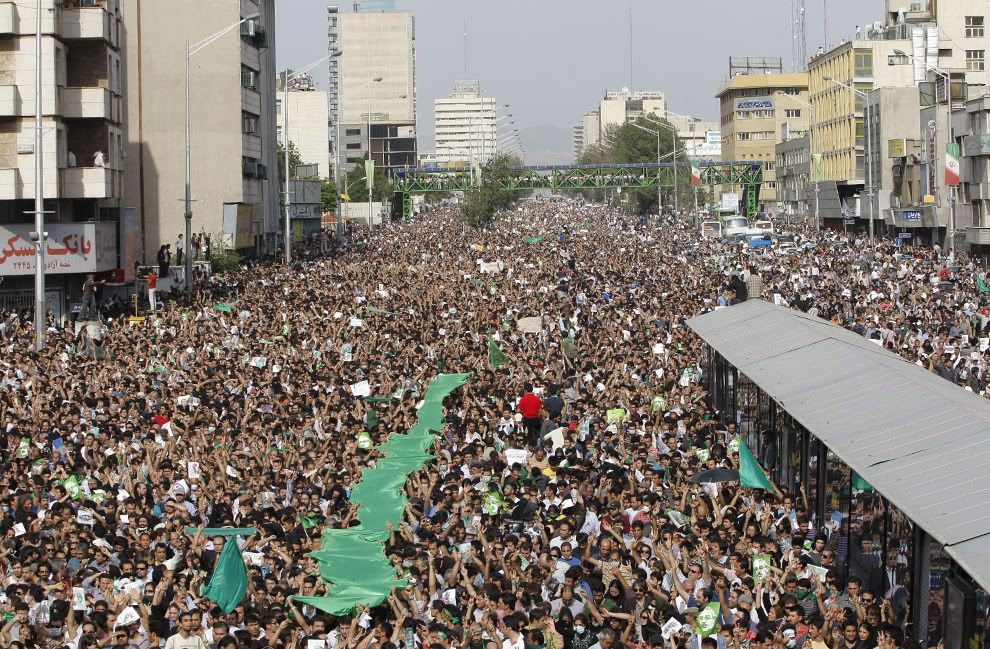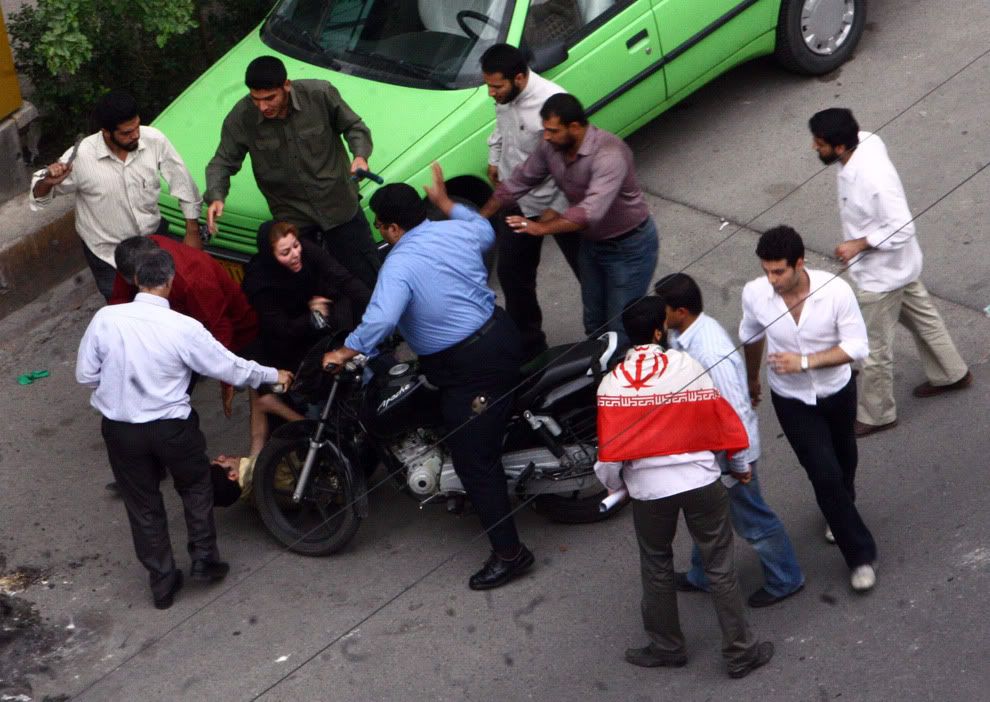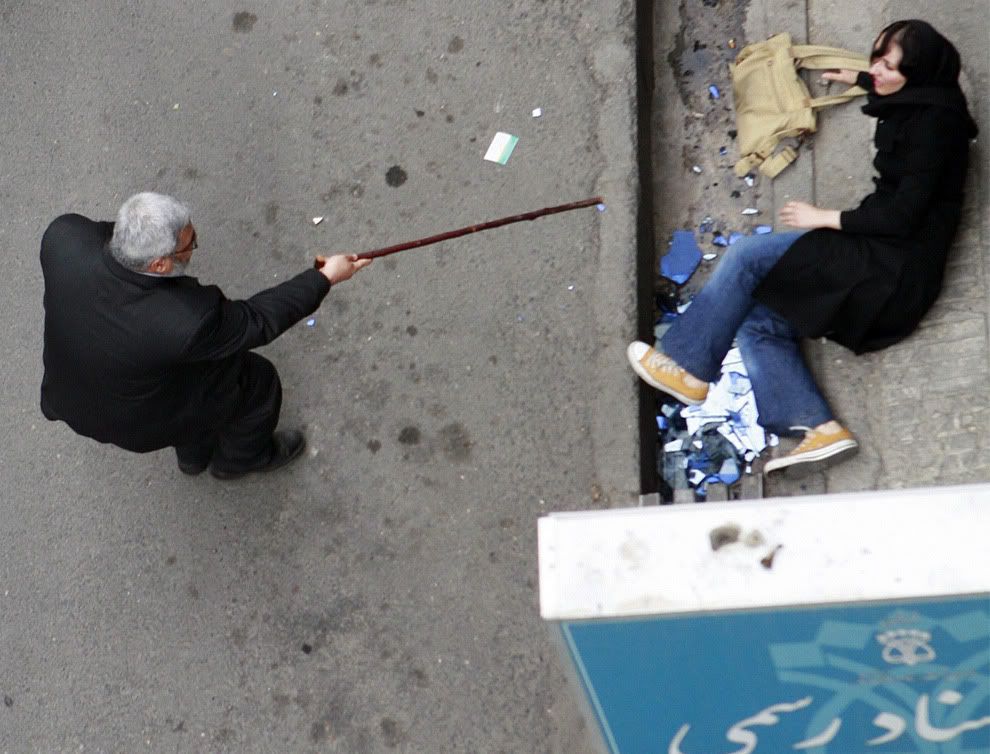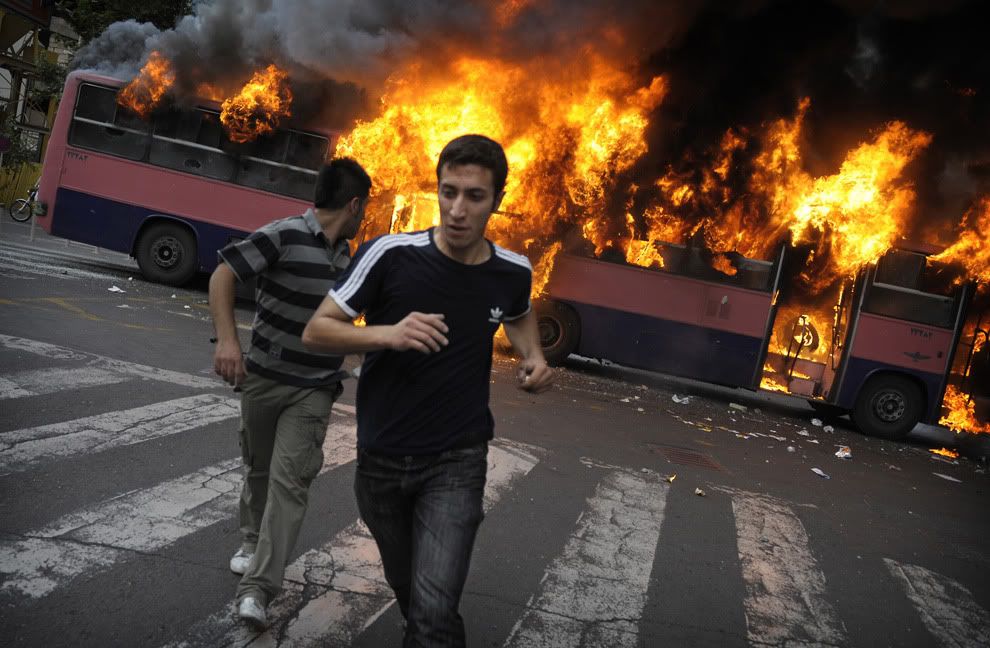This bizarre election process in Iran has at least proved something in that some, if not a bloody good majority, favour equality and certain freedoms associated with us Westerners. It would be easy to jump on the media bandwagon of late and pour scorn on the country that's in the headlines almost as daily as North Korea, based purely on the outrageous comments by their President, but the reality is that Ahmadinejad doesn't speak for the vast majority. His support comes from remote villages - the equivalent of the BNP-voting county of North Yorkshire - whilst the opposition, which favour ties with the West and other personal freedoms deviating from the rules of Islam, reside in the cities.

Right now there is no proof of election fraud. Rumblings of broken seals on ballot boxes have emerged but until the results are recounted, there's very little to go on. One other factor that media outlets are clinging to is the nature of the results being far different from previous elections, with support for the current President coming form all directions when the cities have notoriously been in favour of ties with the West. However, judging by the rallies that have seen hundreds of thousands (and millions judging by today's reports) shows that Iran has a rebellious under-current, a resistance if you will, that doesn't appear to accept another 4 years under this extremist rule.

Iran hasn't seen protests and violence like this since the revolution, when the Western-monopolised Iranian Monarchy were deposed and thrown out of the country and Theocracy became the order of the day. Demonstrations are outlawed, any show of dis-satisfaction brutally taken out and women oppressed, often clothes in a Burkha and demonised by rule-makers that will arrest women for the "crime" of wearing the likes of jeans and trainers. But this last week has shown women protesting alongside men (and beaten by the Police alongside them, too) and marches through the capital filling the wide thoroughfares, burning buses and Police motorbikes - unseen since the country was overhauled. The crowd's attention even fixed on criticising the Supreme Leader - the most important Politician who has the final word on everything - who is regarded as untouchable.

Since then Iran has blocked all communication with the outside world as it attempts to mop up this problem (by killing the protesters, naturally) and avoid any further mishaps with other countries, almost all of whom have condemned the election.
For my liking it shows that Iran isn't as backward and spiteful as is portrayed, as usual it's the establishment that give the population a bad name. The problem too is even with the opposition in office, they're still preaching to the Supreme Leader and his council, who have authority over the President. Whatever happens next, it's certainly an interesting development.


Right now there is no proof of election fraud. Rumblings of broken seals on ballot boxes have emerged but until the results are recounted, there's very little to go on. One other factor that media outlets are clinging to is the nature of the results being far different from previous elections, with support for the current President coming form all directions when the cities have notoriously been in favour of ties with the West. However, judging by the rallies that have seen hundreds of thousands (and millions judging by today's reports) shows that Iran has a rebellious under-current, a resistance if you will, that doesn't appear to accept another 4 years under this extremist rule.

Iran hasn't seen protests and violence like this since the revolution, when the Western-monopolised Iranian Monarchy were deposed and thrown out of the country and Theocracy became the order of the day. Demonstrations are outlawed, any show of dis-satisfaction brutally taken out and women oppressed, often clothes in a Burkha and demonised by rule-makers that will arrest women for the "crime" of wearing the likes of jeans and trainers. But this last week has shown women protesting alongside men (and beaten by the Police alongside them, too) and marches through the capital filling the wide thoroughfares, burning buses and Police motorbikes - unseen since the country was overhauled. The crowd's attention even fixed on criticising the Supreme Leader - the most important Politician who has the final word on everything - who is regarded as untouchable.

Since then Iran has blocked all communication with the outside world as it attempts to mop up this problem (by killing the protesters, naturally) and avoid any further mishaps with other countries, almost all of whom have condemned the election.
"They have arrested anybody they know. Some mullahs been arrested too,
like Mohammad-Ali Abtahi. They have blocked chat too. No chat. No
mobile. No SMS. Nothing. And they are collecting all the satellite
dishes. Twitter is blocked too. The only radio talking about protest 24
hours a day is Radio Farda, but we cant hear it good. I can hear it by
satellite, but by radio it is so weak. [They are jamming it.] They are
collecting satellite dishes. The US should add a transmitter in Iraq.
Radio Farda's only transmitter is in Dubai, so they need to add new one
in Iraq." - Andrew Sullivan.
For my liking it shows that Iran isn't as backward and spiteful as is portrayed, as usual it's the establishment that give the population a bad name. The problem too is even with the opposition in office, they're still preaching to the Supreme Leader and his council, who have authority over the President. Whatever happens next, it's certainly an interesting development.

Powered by ScribeFire.





No comments:
Post a Comment